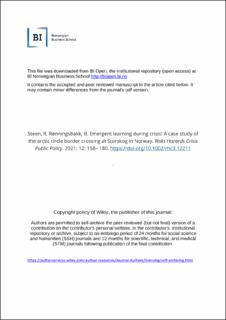| dc.contributor.author | Steen, Riana | |
| dc.contributor.author | Rønningsbakk, Bernt | |
| dc.date.accessioned | 2022-02-07T12:11:06Z | |
| dc.date.available | 2022-02-07T12:11:06Z | |
| dc.date.created | 2020-12-18T15:02:25Z | |
| dc.date.issued | 2020 | |
| dc.identifier.citation | Risks Hazards Crisis Public Policy. 2021; 12 (2),158– 180 | en_US |
| dc.identifier.issn | 1944-4079 | |
| dc.identifier.uri | https://hdl.handle.net/11250/2977469 | |
| dc.description.abstract | This explorative study addresses emergent learning related to the refugee crisis in Norway in 2015. We define emergent learning as organizational learning that occurs as a benign by-product of solving immediate problems as they arise. The study is based mainly on secondary data; media coverage, public evaluation report, and other public documentation. The results from empirical research confirm that emergent learning has had a profound influence on how the Storskog crisis in 2015 was managed. Our findings also reveal suboptimal problem solving, insufficient management capacity, and public organizations who were not prepared to respond fast enough. | en_US |
| dc.language.iso | eng | en_US |
| dc.publisher | Wiley | en_US |
| dc.title | Emergent Learning During Crisis: A case study of the Arctic Circle border crossing at Storskog in Norway | en_US |
| dc.type | Journal article | en_US |
| dc.type | Peer reviewed | en_US |
| dc.description.version | acceptedVersion | en_US |
| dc.rights.holder | Wiley | en_US |
| dc.source.pagenumber | 150-180 | en_US |
| dc.source.volume | 12 | en_US |
| dc.source.journal | Risk, Hazards & Crisis in Public Policy | en_US |
| dc.source.issue | 2 | en_US |
| dc.identifier.doi | 10.1002/rhc3.12211 | |
| dc.identifier.cristin | 1861688 | |
| cristin.ispublished | true | |
| cristin.fulltext | postprint | |
| cristin.fulltext | postprint | |
| cristin.qualitycode | 1 | |
